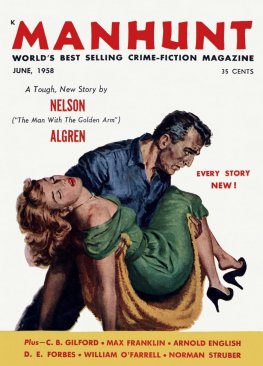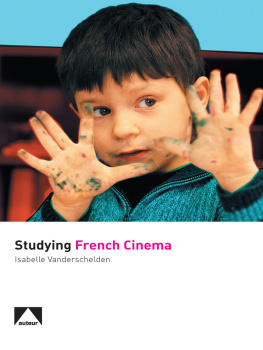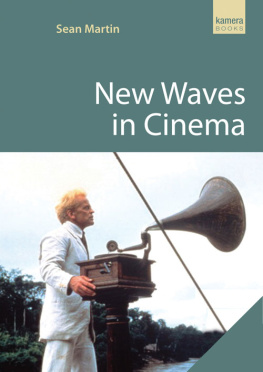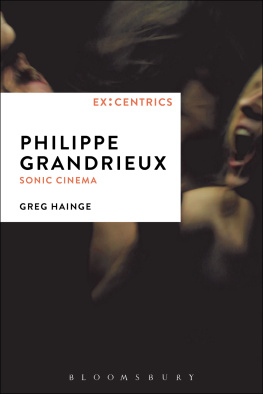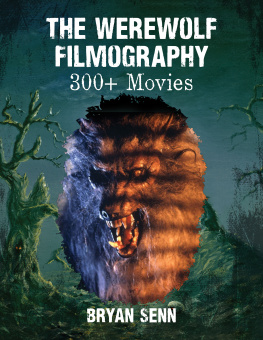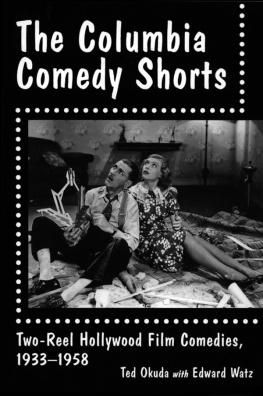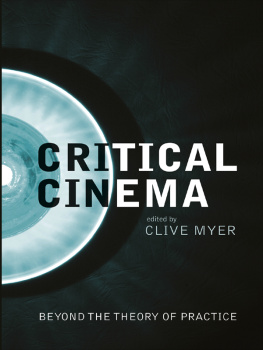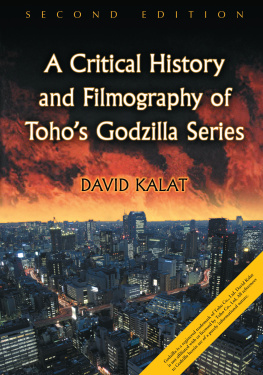Colin Crisp - French Cinema--Critical Filmography: Volume 2, 1940-1958
Here you can read online Colin Crisp - French Cinema--Critical Filmography: Volume 2, 1940-1958 full text of the book (entire story) in english for free. Download pdf and epub, get meaning, cover and reviews about this ebook. year: 2015, publisher: Indiana University Press, genre: Non-fiction. Description of the work, (preface) as well as reviews are available. Best literature library LitArk.com created for fans of good reading and offers a wide selection of genres:
Romance novel
Science fiction
Adventure
Detective
Science
History
Home and family
Prose
Art
Politics
Computer
Non-fiction
Religion
Business
Children
Humor
Choose a favorite category and find really read worthwhile books. Enjoy immersion in the world of imagination, feel the emotions of the characters or learn something new for yourself, make an fascinating discovery.
- Book:French Cinema--Critical Filmography: Volume 2, 1940-1958
- Author:
- Publisher:Indiana University Press
- Genre:
- Year:2015
- Rating:3 / 5
- Favourites:Add to favourites
- Your mark:
- 60
- 1
- 2
- 3
- 4
- 5
French Cinema--Critical Filmography: Volume 2, 1940-1958: summary, description and annotation
We offer to read an annotation, description, summary or preface (depends on what the author of the book "French Cinema--Critical Filmography: Volume 2, 1940-1958" wrote himself). If you haven't found the necessary information about the book — write in the comments, we will try to find it.
Colin Crisp: author's other books
Who wrote French Cinema--Critical Filmography: Volume 2, 1940-1958? Find out the surname, the name of the author of the book and a list of all author's works by series.
French Cinema--Critical Filmography: Volume 2, 1940-1958 — read online for free the complete book (whole text) full work
Below is the text of the book, divided by pages. System saving the place of the last page read, allows you to conveniently read the book "French Cinema--Critical Filmography: Volume 2, 1940-1958" online for free, without having to search again every time where you left off. Put a bookmark, and you can go to the page where you finished reading at any time.
Font size:
Interval:
Bookmark:

FRENCH
CINEMA
FRENCH
CINEMA
COLIN CRISP
A CRITICAL FILMOGRAPHY
VOLUME 2, 19401958
INDIANA UNIVERSITY PRESS
Bloomington and Indianapolis
This book is a publication of
INDIANA UNIVERSITY PRESS
Office of Scholarly Publishing
Herman B Wells Library 350
1320 East 10th Street
Bloomington, Indiana 47405 USA
iupress.indiana.edu
2015 by Colin Crisp
All rights reserved
No part of this book may be reproduced or utilized in any form or by any means, electronic or mechanical, including photocopying and recording, or by any information storage and retrieval system, without permission in writing from the publisher. The Association of American University Presses Resolution on Permissions constitutes the only exception to this prohibition.
The paper used in this publication meets the minimum requirements of the American National Standard for Information SciencesPermanence of Paper for Printed Library Materials, ANSI Z39.48-1992.
Manufactured in the United States of America
Library of Congress Cataloging-in-Publication Data
Crisp, C. G.
French cinema : a critical filmography / Colin Crisp.
volume cm
Includes bibliographical references and index.
Contents: Volume 1. 19291939.
ISBN 978-0-253-01696-6 (vol 1 pbk. : alk. paper) ISBN 978-0-253-01703-1 (vol 1 ebook)
ISBN 978-0-253-01695-9 (vol 2 pbk. : alk. paper) ISBN 978-0-253-01702-4 (vol 2 ebook)
ISBN 978-0-253-01795-6 (vol 3 pbk. : alk. paper) ISBN 978-0-253-01796-3 (vol 3 ebook)
1. Motion picturesFranceCatalogs. I. Title.
PN1993.5.F7C783 2015
016.79143750944dc23
2015008318
1 2 3 4 5 20 19 18 17 16 15
The road ahead is one of collaboration.
Marshall Ptain, 16 June 1940
The flame of French resistance can never be extinguished, will never be extinguished.
General Charles de Gaulle, 17 June 1940
Very few [members of the film community] manifested the spirit of collaboration, very few the spirit of resistance.
F. Courtade, 1978
Compromises? Cohabitation? Collaboration? But in a system where everything was subject to authorization, in order to work, you had to be at least legally a collaborator.
G. and J.-R. Ragache, 1988
Its all a mess, you know, all rotten to the core. Apart from myself I only know of three or four real national-socialists in the whole of Europe. And just quietly, Im not at all sure that Adolf Hitler is one of them.
Lucien Rebatet, 1941
The masters of the international cinema have for too long been businessmen (and, whats worse, Jewish businessmen ).
Gaston Derycke, 1943
In the history of the cinema, the first generation belonged to producers, the second to directors; now a third generation is coming onto the scene, that of authors.
Jean Renoir, 1938
The cinema as spectacle is dying out; make way for the cinema as world-view.
Roger Leenhardt
Behind the screen, the author has completely disappeared; what a relief.
Paul Claudel
The cinema is a minor art.
Marcel Pagnol
The cinema too easily becomes bogged down in technique. It can sometimes see material progress as the discovery of a new style.
Jacques Feyder
One crucial thing the sound cinema invented was silence.
Robert Bresson
From the moment when people only see films without flies in them, they will naturally think of the world as without flies, and will unconsciously tend to bring about such a world.
Alexander Arnoux
Henri Jeanson is an anarchist, and I detest anarchists. Hes a boulevardier and I spit on all boulevardiers. Hes indecisive and a wimp, and Im all for the extermination of such people. But I have to admit, he has talent.
Nino Frank, 1950
CONTENTS
FRENCH
CINEMA
INTRODUCTION
Social, Political, and Institutional Context
The films dealt with in this filmography were produced during a time of intense political, social, and institutional change. The most dramatic events, of course, relate to World War II, so the period can initially be divided into two distinct if unequal sections: first, the war years (September 1939September 1945, including the German occupation of France from June 1940 to August 1944), and second, the postwar period, marked by progressive prosperity, reconstruction, and the development of what was to become known as neo-capitalism or consumer capitalism. If the declaration of war provides a clear-cut initial date for this filmography, the terminal date is less obvious. In political terms, however, the period 19461958 corresponds to Frances Fourth Republic and ends with the signing into existence of the Common Market, while in institutional terms, the years 19581960 saw the production (and, for the most part, release) of the first feature films by many of those directors later classified as the New WaveClaude Chabrol (Le Beau Serge and Les Cousins, both produced in 1958), Franois Truffaut (Les 400 Coups, 1958), Alain Resnais (Hiroshima mon amour, 1958), Pierre Kast (Le Bel ge, 1958), Jacques Rivette (Paris nous appartient, 1958), Jacques Doniol-Valcroze (LEau la bouche, 1959), Jean-Luc Godard ( bout de souffle, 1959), and ric Rohmer (Le Signe du lion, 1959). Those years also saw the production of the final (or, where they continued, the final significant) films of most members of the previous generationsJulien Duvivier (Marie Octobre, La Femme et le pantin, 1959), Marcel Carn (Les Tricheurs, 1957, #101), the Allgret brothers, Claude Autant-Lara (La Jument verte, 1959), Henri-Georges Clouzot (La Vrit, 1960), Abel Gance and Roger Richeb (Austerlitz, 1959), Jean Delannoy (La Princesse de Clves, 1960), and Jacques Becker (Le Trou, 1959), while both Jean Cocteau and Jean Renoir metaphorically bade farewell to the cinema with Le Testament dOrphe and Le Testament du Dr. Cordelier (both 1959), respectively. I have confined the entries here to feature-length films, so it is logical to leave all material related to the apprenticeship of those figures who established the New Wavetheir short and mid-length films, many of which nevertheless created a degree of controversyto be dealt with in the volume covering their ascendancy in the following decade.
Rather than organizing the films discussed here into two unbalanced segments, of six and thirteen years respectively, I have divided the book into three roughly equal periods, since any close look at the postwar period reveals a series of social and institutional disjunctions around 19511952, which in turn contributed to an evolutionary transformation in the types of films that were produced before and after that year. The following factors, illustrated in the table, are relevant to this disjunction:
 Spectator numbers in France reached a record high of 420 million in 1947, and descended steadily thereafter to 370 million in 1952, after which they began to rise again.
Spectator numbers in France reached a record high of 420 million in 1947, and descended steadily thereafter to 370 million in 1952, after which they began to rise again.
 Undoubtedly as a result of this, but with an inevitable delay due to the delayed feedback to producers, the number of films produced, after climbing to 120 in 1949 and 1950, began its plunge in 1952 toward a low of 80 in 1954, recovering in 1955.
Undoubtedly as a result of this, but with an inevitable delay due to the delayed feedback to producers, the number of films produced, after climbing to 120 in 1949 and 1950, began its plunge in 1952 toward a low of 80 in 1954, recovering in 1955.
 Some critics feared a crisis of quality in 1951, when no film was judged worthy of the Prix Louis Delluc.
Some critics feared a crisis of quality in 1951, when no film was judged worthy of the Prix Louis Delluc.
Font size:
Interval:
Bookmark:
Similar books «French Cinema--Critical Filmography: Volume 2, 1940-1958»
Look at similar books to French Cinema--Critical Filmography: Volume 2, 1940-1958. We have selected literature similar in name and meaning in the hope of providing readers with more options to find new, interesting, not yet read works.
Discussion, reviews of the book French Cinema--Critical Filmography: Volume 2, 1940-1958 and just readers' own opinions. Leave your comments, write what you think about the work, its meaning or the main characters. Specify what exactly you liked and what you didn't like, and why you think so.



